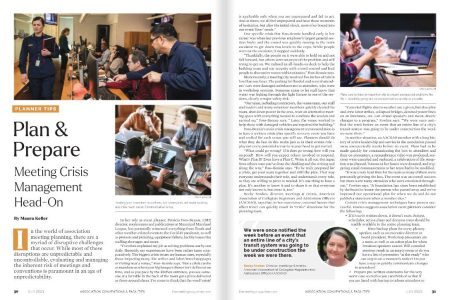Jeremiah Shirk was recently featured on The Meeting Magazines website in an article called Plan & Prepare: Meeting Crisis Management Head-On, by Maura Keller.
Jeremiah Shirk and his counterparts Patricia Foss-Bennie (CMP, director, conferences and publications at Municipal Maryland League) and Becky Fowkes (Director, meetings & events, American Association of Collegiate Registrars and Admissions Officers (AACRAO)) discuss their experiences in managing crises, the pitfalls and lessons learned.
In the evolving world of event planning, challenges abound. Crises and disruptions are often unpredictable and beyond anyone’s control, though one thing remains clear: the evaluation and management of risks associated with large scale events have never been more crucial.
Foss-Bennie has weathered a storm of disruptions throughout her career. From natural disasters like floods to the sudden onset of the Covid-19 pandemic, and even the unexpected presence of protests and equipment failures, she’s seen it all. However, as she emphasizes, her most significant challenges have often been human in nature, such as strikes, labor stoppages, or protests near event venues. Yet, she firmly believes that the term ‘crisis’ applies only when one is unprepared and fails to act. In her experience, the key to successful crisis management is preparation and swift, organized action.
One memorable crisis that Foss-Bennie handled early in her career involved a sudden escalator malfunction during a major general session. Despite the panic, her team rallied quickly, ensuring the safety of attendees and rerouting them to alternative paths. In another instance, heavy rain caused significant damage and potential safety hazards – her team’s quick response, along with the venue’s assistance, averted a major disaster. Her advice is clear: have a written crisis plan for each event and venue, anticipate potential scenarios, and drill the plan with your team to ensure everyone understands their role and can pivot as needed. Fowkes and Shirk would add here that treating the venue staff, vendors and contractors as partners is crucial in these circumstances, allowing swift and cooperative action where everyone knows their role.
Becky Fowkes has faced her own share of challenges. She notes that external factors affecting travel, such as canceled flights due to weather, labor strikes, or unforeseen construction, can quickly escalate into crisis situations for event planners. She talks about a particularly challenging situation where an esteemed member of their organization passed away suddenly, requiring swift adjustments to their event program and communication plans, all while managing their own grief.
To navigate such challenges, Fowkes recommends several crisis management techniques, including having written scripts, schedules, and action plans readily available, creating backup plans for speakers, and preparing pre-written statements for worst-case scenarios. She also emphasizes the importance of a well-organized command and control structure to prevent confusion and miscommunication.
Jeremiah Shirk brings his extensive experience in organizing events, including presidential events and collaborating with security and city planners, to the discussion. He highlights the importance of having a proactive infrastructure for effective communication with clients and stakeholders to address issues swiftly. Shirk’s emphasis is on planning for crises rather than hoping for the best, as the consequences of not being prepared can be catastrophic.
One common mistake he highlights is an inefficient command and control structure, which can lead to confusion and miscommunication. Delegating tasks based on expertise and capabilities can help address crises more efficiently. He also points out the role of technology in both enhancing events and introducing potential issues, highlighting the need for backup plans and support systems in place.
As the enterprise events industry continues to evolve, Foss-Bennie and Shirk foresee new challenges emerging. The post-Covid world will see the continued importance of factors like sanitization, air quality, energy, privacy, and digital security in event crisis planning. In this changing landscape, crisis plans are likely to become more customized and specific to each organization and individual event. As the industry continues to evolve, planners must adapt and refine their crisis management strategies to meet the challenges of the future.
–
In the world of complex problem-solving and strategic planning, having an experienced and reliable partner can make all the difference. Showpiece Solutions is here to be that partner for you, bringing expertise, innovation, and a commitment to excellence in every project we undertake.
Ready to take the next step towards success? Contact us today and discover how Showpiece Solutions can elevate your operations planning to the next level.

